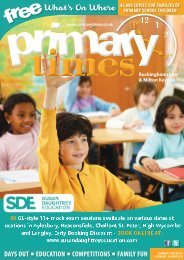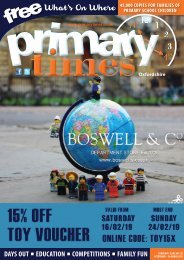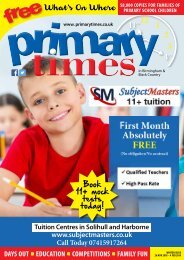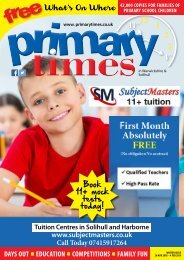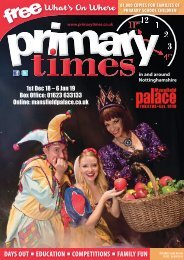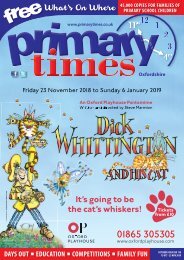PTO_Xmas18_LR_COMBINED
Create successful ePaper yourself
Turn your PDF publications into a flip-book with our unique Google optimized e-Paper software.
ARCh Reading Helpers provide personalised<br />
support to children in Oxfordshire primary schools.<br />
Our trained volunteers<br />
work one to one with<br />
children to boost<br />
confidence, build<br />
self-esteem and turn<br />
around negative<br />
attitudes to reading.<br />
We are looking for<br />
volunteers, businesses<br />
and sponsors who<br />
would like to join us in<br />
making a real difference to children’s lives.<br />
To find out more, visit our website<br />
www.archoxfordshire.org.uk<br />
If you would like to get involved, or<br />
if you are a school interested in our service,<br />
please telephone us on 01869 320380<br />
Volunteers are DBS checked and receive<br />
ongoing support and training.<br />
Please support us – you can donate via<br />
https://localgiving.org/donation/arch<br />
Registered Charity number 1146276<br />
Company number 7962217<br />
To arrangeavisit,contact our<br />
Admissionsteam<br />
01235 530593<br />
www.shsk.org.uk<br />
admission@shsk.org.uk<br />
PRIMARY TIMES EXCLUSIVE<br />
Bonjour!<br />
Guten Tag!<br />
Ciao!<br />
How studying asecond language from an early age<br />
helps your children in school, at home, and beyond<br />
In our increasingly<br />
diverse society,<br />
the ability to speak<br />
a second, or even<br />
third, language is of growing<br />
value. Opening our minds to<br />
learning and embracing new<br />
languages, especially from<br />
a young age, can bring rich<br />
rewards and be agreat way<br />
to prepare our children for<br />
success in every aspect of<br />
their adult lives.<br />
Whilst learning asecond<br />
language at any age will bring<br />
multiple benefits, research<br />
studies have shown that<br />
early exposure to asecond<br />
language will positively help<br />
define achild’s retention of<br />
vocabulary, pronunciation<br />
and cognitive development.<br />
As children’s brains develop,<br />
they retain new vocabulary<br />
and knowledge very quickly<br />
and, as aresult, can grasp<br />
language structures far<br />
more naturally than adults.<br />
Consequently, the more<br />
exposure achild has to<br />
their new language, the<br />
more fluent they will<br />
eventually become.<br />
By using adifferent<br />
language system, achild’s<br />
oral and written English<br />
communication skills will<br />
vastly improve. As their<br />
knowledge develops, they<br />
will begin to compare foreign<br />
words and phrases to their<br />
English counterparts and,<br />
as aresult, find similarities,<br />
differences and anomalies.<br />
This general understanding<br />
will improve their problemsolving<br />
skills, creativity,<br />
reading, and writing in their<br />
school years, as well as<br />
their adult life.<br />
Alongside this, introducing<br />
a second language into<br />
the home will encourage<br />
you and your child to learn<br />
about and develop agreater<br />
understanding of different<br />
cultures. This will allow your<br />
child to better understand<br />
the expressions and styles<br />
of communication that differ<br />
from our own, as well as<br />
the scale of the world in<br />
which we live.<br />
This opens their mind and<br />
can also be agreat way for<br />
you and your family to<br />
explore different<br />
cuisines, activities and<br />
lifestyles!<br />
FOCUS ON EDUCATION<br />
School busservicewith collectionpoints<br />
across Oxford and the Thames Valley<br />
Independentday school for girls aged 9–18<br />
ABINGDON • OXFORDSHIRE




